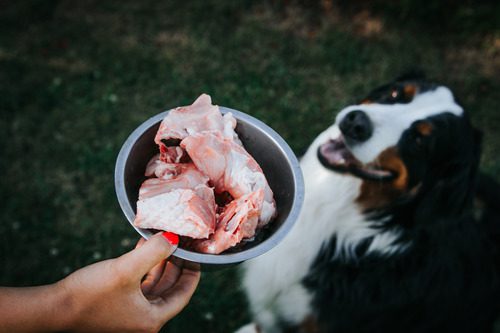Should Dogs Eat Turkey Bones?
Celebrating with our pets by sharing table foods is common and the right table treats are usually well-tolerated in small amounts. With the holiday season fast approaching, some owners may wonder, should dogs eat turkey bones?
Dogs may disagree. However, the best answer is that dogs should not eat turkey bones.

The Dangers of Feeding Turkey Bones to Dogs
Feeding turkey bones to your dog poses several significant risks:
Choking
Turkey bones, particularly those that are cooked, can easily splinter and cause choking. Even if your dog manages to swallow the bone fragments, they can still pose a severe risk.
Internal Injuries
If your dog does manage to swallow bone fragments, the splintered bones can cause internal injury and, in some cases, puncture the gastrointestinal tract which can lead to painful and potentially life-threatening peritonitis.
Digestive Blockages
Bone fragments can also become lodged in your dog’s intestines and cause obstruction. Symptoms of a blockage include vomiting, lethargy, and abdominal pain. This condition often requires surgical intervention. Painful defecation and injury can also result as sharp bone fragments are passed.
What to Do If Your Dog Eats a Turkey Bone
Despite your best efforts, accidents can happen. If your dog manages to eat a turkey bone, here’s how to respond:
Monitor for Symptoms
Keep a close eye on your dog for any signs of distress. Symptoms to watch for include vomiting, gagging, drooling, difficulty swallowing, refusing to eat, or signs of abdominal pain. If you notice any of these symptoms, contact Ann Arbor Animal Hospital immediately at (734) 662-4474.
Contact Your Veterinarian
Even if your dog appears to be fine after consuming a turkey bone, it’s a good idea to consult your veterinarian. They can provide guidance on what steps to take next and whether your dog needs to be examined.
Avoid Home Remedies
Refrain from attempting home remedies or inducing vomiting without veterinary advice. In some cases, inducing vomiting can cause further harm. Always seek professional guidance to ensure your dog’s safety.
Alternative Treats for Your Dog
If your pet enjoys chewing, consider these options:
- Commercial Chew Toys: Investing in high-quality chew toys designed for dogs can provide a safe and enjoyable alternative. These toys are specifically made to withstand heavy chewing and can help keep your dog’s teeth clean and strong.
- Dental Chews: Dental chews are another excellent option for promoting oral health. They are formulated to reduce plaque and tartar buildup while satisfying your dog’s natural chewing instincts. Look for products that are veterinarian-approved.
If you’d like to share small amounts of holiday foods with your pets, consider these safer options:
- Lean turkey meat, (avoid sharing skin, fat, and gravy as these can cause painful pancreatitis.)
- Cooked sweet potato or plain cooked pumpkin.
- Small pieces of raw or cooked green beans, carrots, apples.
Ensuring Your Dog’s Safety During Holiday Meals
Holiday meals often involve a variety of foods that can be tempting for your dog. Taking precautions can help ensure their safety and prevent accidental ingestion of harmful items.
Keep Food Out of Reach
During holiday gatherings, keep food and trash out of your dog’s reach. Place dishes on high surfaces or in secure containers and trash in secure containers or outdoors to prevent your dog from accessing them. Inform your guests about the importance of not feeding your dog table scraps.
Create a Safe Space
A quiet room or a comfortable crate away from the hustle and bustle can help your pet relax. Providing them with their own treats and toys can help keep them occupied.
Educate Your Guests
Inform your guests about the potential dangers of feeding turkey bones to your dog. Ask them to refrain from giving your dog any table scraps, no matter how tempting it may be. Clear communication can prevent accidents and ensure a safe environment for your pet.
For more information on your dog’s diet and safety, or if you have any concerns, please call Ann Arbor Animal Hospital at (734) 662-4474.
Recent Posts
About Us
Ann Arbor Animal Hospital is a locally-owned animal hospital operating for over 90 years in Ann Arbor, MI.
